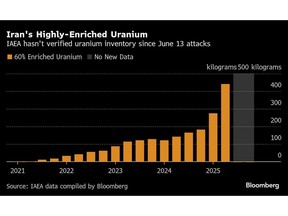
Article content
(Bloomberg) — Iran is ignoring international calls to cooperate with the United Nations atomic watchdog and restart nuclear talks with the US, diplomats said, months into a tense stand off following Israeli-led airstrikes on the Islamic Republic.
THIS CONTENT IS RESERVED FOR SUBSCRIBERS ONLY
Subscribe now to read the latest news in your city and across Canada.
- Exclusive articles from Barbara Shecter, Joe O'Connor, Gabriel Friedman, and others.
- Daily content from Financial Times, the world's leading global business publication.
- Unlimited online access to read articles from Financial Post, National Post and 15 news sites across Canada with one account.
- National Post ePaper, an electronic replica of the print edition to view on any device, share and comment on.
- Daily puzzles, including the New York Times Crossword.
SUBSCRIBE TO UNLOCK MORE ARTICLES
Subscribe now to read the latest news in your city and across Canada.
- Exclusive articles from Barbara Shecter, Joe O'Connor, Gabriel Friedman and others.
- Daily content from Financial Times, the world's leading global business publication.
- Unlimited online access to read articles from Financial Post, National Post and 15 news sites across Canada with one account.
- National Post ePaper, an electronic replica of the print edition to view on any device, share and comment on.
- Daily puzzles, including the New York Times Crossword.
REGISTER / SIGN IN TO UNLOCK MORE ARTICLES
Create an account or sign in to continue with your reading experience.
- Access articles from across Canada with one account.
- Share your thoughts and join the conversation in the comments.
- Enjoy additional articles per month.
- Get email updates from your favourite authors.
THIS ARTICLE IS FREE TO READ REGISTER TO UNLOCK.
Create an account or sign in to continue with your reading experience.
- Access articles from across Canada with one account
- Share your thoughts and join the conversation in the comments
- Enjoy additional articles per month
- Get email updates from your favourite authors
Sign In or Create an Account
or
Article content
The status of the Iran’s nuclear program — including the state and unknown location of its near-bomb-grade uranium stockpile — is the subject of a meeting next week at the International Atomic Energy Agency in Vienna. Western nations represented there are due to draft new orders for IAEA inspectors to determine the status of Tehran’s nuclear inventory, according to three officials who asked not to be identified in return for discussing restricted information.
Article content
Article content
Article content
The IAEA is prepared to resume inspections of Iran’s nuclear sites immediately, but Iran insists they’re still too dangerous after airstrikes by Israel and the US five months ago, one senior western diplomat said.
Article content
By signing up you consent to receive the above newsletter from Postmedia Network Inc.
Article content
Tehran may be gambling that an information blackout will deter any follow up strikes, the person said, while adding that those countries could equally call the bluff and bomb due to a lack of communication. IAEA Director General Rafael Mariano Grossi said in September that cooperation with his inspectors was crucial to diminish the threat of renewed military strikes.
Article content
Consensus is fraying over what to do next, with some western countries seeking to apply additional pressure on Iran by stripping scientists of access to IAEA technical cooperation in areas like nuclear medicine, the diplomats said. Other nations caution that cutting all Iranian support could backfire and increase the chance of the country withdrawing from the Treaty on the Non-Proliferation of Nuclear weapons.
Article content
Iran’s nuclear work has concerned the West for decades and tensions over the nature of its atomic program — which dates back to the 1950s — have frequently shaken oil markets and spurred fits of both conciliation and conflict with the US. The Islamic Republic has always denied harboring intentions to develop a nuclear weapon and says it’s accelerated its uranium enrichment in response to US President Donald Trump’s first-term decision to quit the landmark 2015 nuclear deal and heavily sanction its economy.
Article content
Article content
Iran possessed sufficient highly-enriched uranium reserves to quickly craft about a dozen nuclear warheads before the June attacks. Since then, the IAEA has lost track of the material and Grossi says the lack of knowledge is a serious concern.
Article content
Recent satellite imagery shows Iranian activity around the bombed sites in Fordow, Natanz and Isfahan. Agency inspectors aren’t certain whether the activities are restricted to clean-up efforts or potentially include relocating uranium inventories.
Article content
A statement issued by Group of Seven nations earlier this week called on Iran to resume full cooperation with the IAEA and engage in direct talks with the Trump administration. An Iranian foreign ministry spokesman rejected that call because it failed to condemn the Israeli and US attacks on its facilities, the state-backed Mehr News Agency reported.
Article content
“No new message has been conveyed to the US,” Iranian Security Council Secretary Ali Larijani said in a statement earlier this week. “The reason no new message has been sent is that previous negotiations had already taken place, and the other side showed no willingness to reach an agreement.”
Article content
Even if the Islamic Republic immediately submitted to inspections and fully cooperated with the IAEA, it could take years to re-establish certainty over the fate of Iran’s nuclear stockpile, a second diplomat said. Containment vessels where the material is stored may have been destroyed, releasing kilograms-worth of uranium into the environment. The June attacks didn’t end concerns over country’s nuclear program, they just opened a new chapter, the person said.
Article content

.jpg) 1 hour ago
2
1 hour ago
2
 English (US)
English (US)